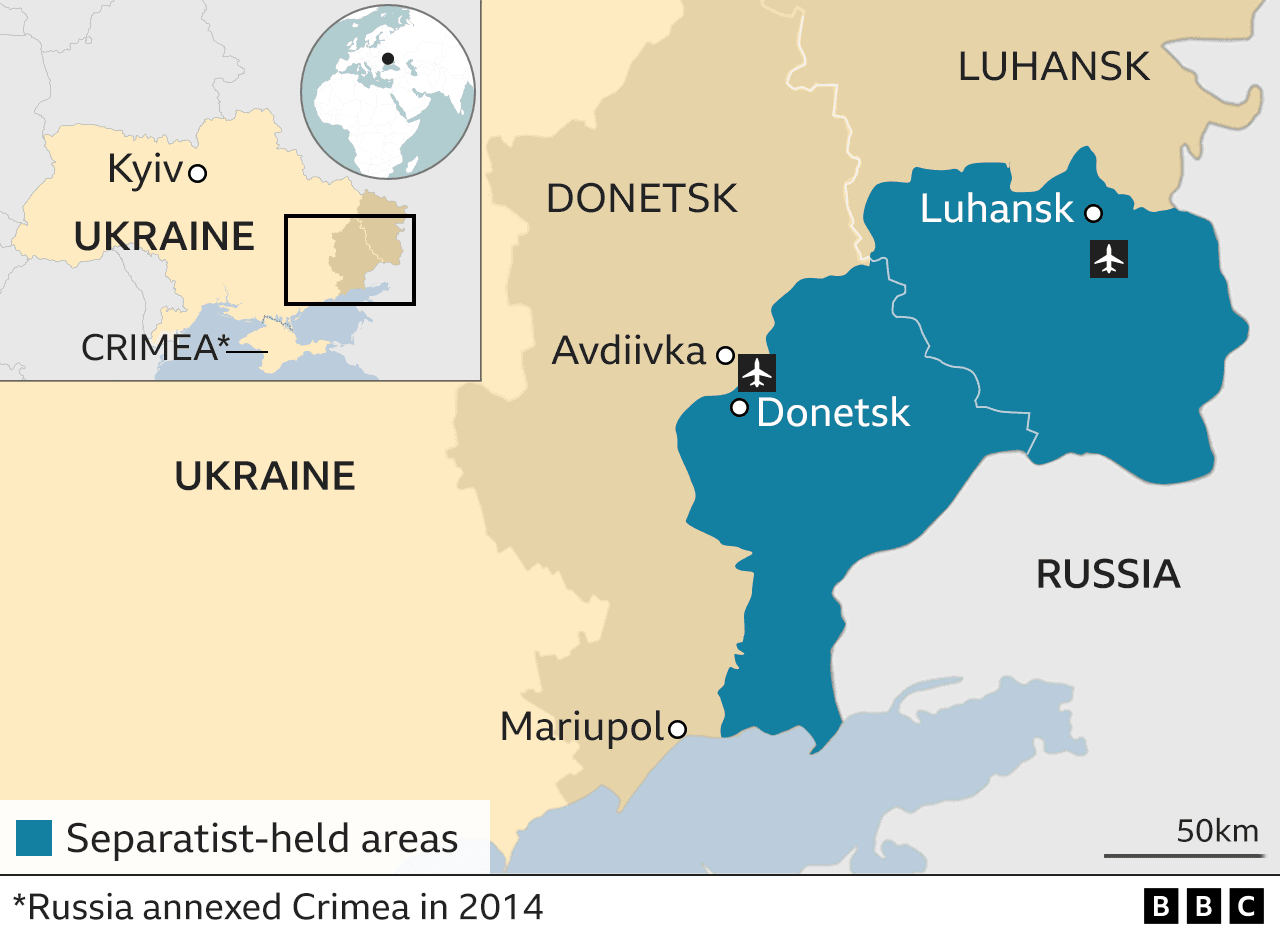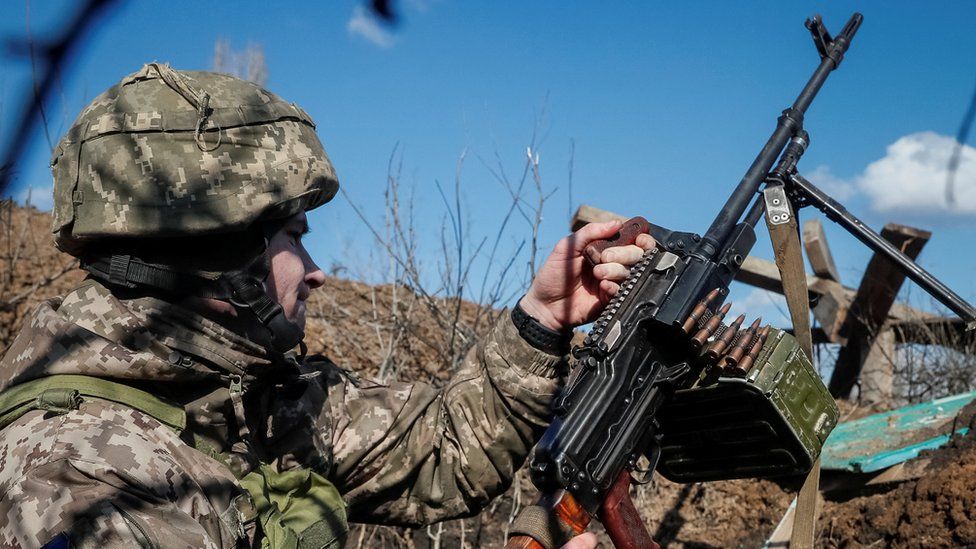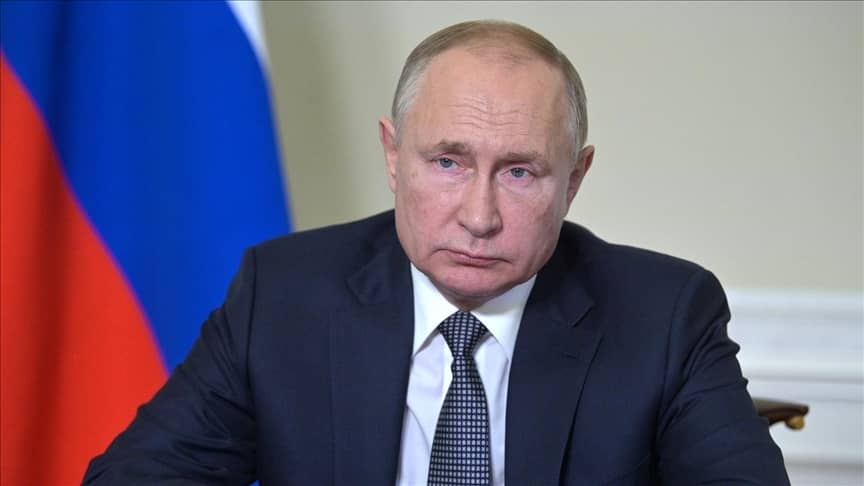Russian President Vladimir Putin has ordered troops into two rebel-held regions in eastern Ukraine, after recognising them as independent states.
Russia said the troops would engage in “peacekeeping” in the self-declared Donetsk and Luhansk people’s republics.
But the US said calling them peacekeepers was “nonsense”, and that Russia was creating a pretext for war.
The two regions are home to Russian-backed rebels who have been fighting Ukrainian forces since 2014.
Ukraine’s president accused Russia of wilfully violating its sovereignty.
In a late-night televised address to the nation, President Volodymyr Zelensky said Ukraine wanted peace, but declared: “We are not afraid” and “will not give anything away to anyone”. Kyiv needed “clear and effective actions of support” from its international partners, he said.
“It is very important to see now who our real friend and partner is, and who will continue to scare the Russian Federation with words only,” he added.
At an emergency meeting of the UN Security Council, US Ambassador Linda Thomas-Greenfield dismissed Russia’s claims that troops would be taking on a “peacekeeping” role, saying: “We know what they really are”.
Recognising Luhansk and Donetsk as independent was part of Russia’s bid to create a reason to invade Ukraine, she said.


Meanwhile, Russia’s UN Ambassador Vasily Nebenzya argued for the need to defend the rebel-held areas in eastern Ukraine’s Donbas region from what he called Ukrainian aggression. “Allowing a new bloodbath in the Donbas is something we do not intend to do,” he said.
In recent years, Russian passports have been given out to large numbers of people in Donetsk and Luhansk, and Western allies fear Russia will now move military units in under the guise of protecting its citizens.
In an hour-long address on Monday, Mr Putin said modern Ukraine had been “created” by Soviet Russia, referring to the country as “ancient Russian lands”.
He referred to Russia having been “robbed” during the collapse of the Soviet Union in 1991, accused Ukraine of being a “US colony” run by a puppet government, and alleged that people were suffering under its current leadership. He painted the 2014 protests which toppled Ukraine’s pro-Russia leader as a coup.
‘It’s unacceptable and unprovoked’
The US swiftly condemned Mr Putin’s move, and President Joe Biden signed an executive order that prohibits new investment, trade and financing by Americans in the breakaway regions. The White House said the measures were separate to wider Western sanctions which are ready to go “should Russia further invade Ukraine”.
UK Prime Minister Boris Johnson said Russia’s actions amounted to “a flagrant violation of the sovereignty and integrity of Ukraine” that breaks international law. He said it was “a very ill omen and a very dark sign”. He is set to chair a meeting of the government’s emergency committee on Tuesday to agree a significant package of sanctions against Russia.
The European Union pledged to “react with unity, firmness and with determination in solidarity with Ukraine”.
Australia’s Prime Minister Scott Morrison rejected the suggestion that Russian troops would have a peacekeeping brief, telling reporters: “It’s unacceptable, it’s unprovoked, it’s unwarranted… some suggestion that they are peacekeeping is nonsense.”
The move by Vladimir Putin deepens the ongoing crisis in Ukraine, which is surrounded by more than 150,000 Russian troops on its borders. Russia has denied planning to invade, but the US believes an attack is imminent.
Both Germany’s Chancellor Olaf Scholz and French President Emmanuel Macron spoke with the Russian leader ahead of his announcement. Western powers have rallied behind Ukraine, promising harsh sanctions against Russia if it invades – though it is not yet clear how far the response to this move will go.
Putin builds to a showdown

This speech was Putin the angry, impatient and directly threatening. It felt like Russia’s president was getting 20-odd years of hurt off his chest and hitting back.
“You didn’t want us to be friends,” was how he put it to the West, “but you didn’t have to make an enemy of us.”
There was a lot we’ve heard before, repackaged for this moment when he knows he has maximum attention.
He’s clearly ceding no ground on his key security demands: Nato expansion must be rolled back, and Ukrainian membership is a red line. He complained that Russia’s concerns had been ignored as irrelevant for years and accused the West of trying to “contain” Russia as a resurgent global force.
Mr Putin’s focus on Ukraine felt obsessive, like a man who thinks about little else. At times it sounded like a bid to run for president there, it was so detailed.
And, of course, there was his re-writing of Ukrainian history, to claim it has never really been a state. In today’s context, that had deeply ominous overtones.
Recognising the two breakaway regions of Ukraine could mean Russian troops go in openly, very soon – invited as “peacemakers”. Or there could be a pause, as Putin waits to see his opponent’s next move.
In all this, Ukraine is the battleground. But it’s also a game of brinkmanship between Russia and the West, rapidly building to a showdown.


Groundwork for the controversial decision was laid earlier on Monday, when Mr Putin convened Russia’s security council to discuss recognising the self-declared republics as independent.
Mr Putin’s top officials were called to a podium to deliver their views, each speaking in favour of the move. Monday’s televised meeting was not entirely smooth, however.
Two officials, during their exchanges with Mr Putin, appeared to reference the possibility to “incorporate” the regions into Russia. On both occasions, Mr Putin corrected them.
“We are not talking about that, we are not discussing that,” he said, shaking his head in response to one official’s use of the phrase. “We are talking about whether to recognise their independence or not.”


